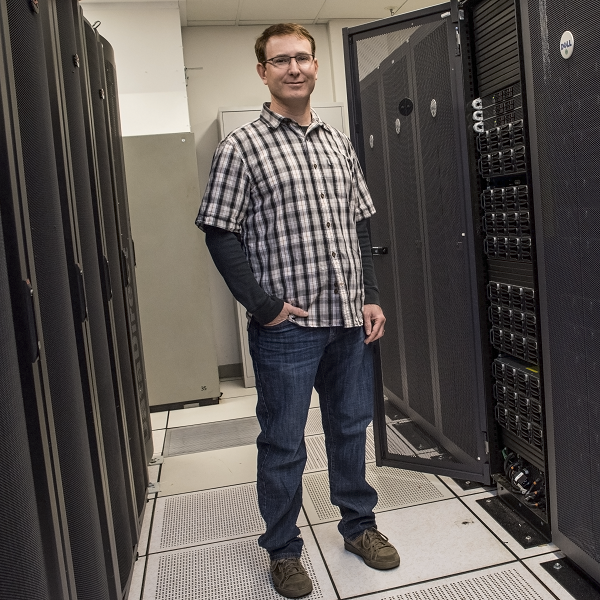 RENO, Nev. — May 18, 2023 — CIQ, the company behind Rocky Linux, today launched Fuzzball, a tool designed to unify the power of infrastructure optimized for all Performance Intensive Computing (PIC) workloads, such as sophisticated research, scientific modeling, AI/ML and compute and data analytics, with the agility and choice that enterprises have come to expect with hyperscale cloud computing.
RENO, Nev. — May 18, 2023 — CIQ, the company behind Rocky Linux, today launched Fuzzball, a tool designed to unify the power of infrastructure optimized for all Performance Intensive Computing (PIC) workloads, such as sophisticated research, scientific modeling, AI/ML and compute and data analytics, with the agility and choice that enterprises have come to expect with hyperscale cloud computing.
High performance computing (HPC) has been limited by an antiquated and rigid 30-year-old architecture. Until the advent of PIC-as a Service (PICaaS), users were restricted to expensive, on-premises, monolithic deployments requiring dedicated administration and maintenance. PICaaS brought HPC to the cloud, but until Fuzzball there was no way to unify these two worlds and allow workloads to run in the place that makes the most sense for researchers and the organizations that empower them.
Fuzzball unites these rapidly converging use cases by providing a single platform that deftly combines the best of both worlds into an entirely new computing paradigm that CIQ calls “HPC 2.0.” The software offers a turnkey, Kubernetes-based, hybrid computing infrastructure stack that empowers users with more control, administrators with more reach, and organizations with more productivity. It manages the data and compute lifecycle of performance-intensive workloads in hybrid cloud environments, allowing scientists, researchers and analysts to easily develop and execute their critical workloads anywhere to optimize resources and performance. Fuzzball delivers all the long-awaited advantages of hybrid cloud to supercomputing, including automated pipelines, resource optimization, identity and access management, absolute reproducibility, accountability, supply chain management, controls, data management and dynamic provisioning.
Historically, PIC workloads and use cases have been supported by traditional, on-premises HPC resources. Increasingly, they’re supported by emerging PICaaS services which are offered by hyperscale cloud providers like Amazon Web Services (AWS) and others. International Data Corporation (IDC) recently projected that the PICaaS market worldwide will grow from $22.3 billion in 2021 to $103.1 billion in 2027 with a compound annual growth rate (CAGR) of 27.9 percent over the 2022-2027 forecast period.

Greg Kurtzer, CEO of CIQ
“We coined the term ‘HPC 2.0’ because it perfectly captures what Fuzzball is all about,” said Gregory Kurtzer, CEO of CIQ and founder of open source projects Rocky Linux, Apptainer (formerly Singularity) and Warewulf. “It reimagines the foundations of performance-intensive computing, drawing from innovations in both HPC and modern cloud-scale computing. Fuzzball encapsulates user programs, containers, resource requirements, volumes and data management into reproducible, run-anywhere workflows. This means researchers, scientists and analysts can compose and execute workflows with a click of a button. Behind the scenes, Fuzzball manages the complex data-in and data-out processes, resource management, orchestration and all the execution in between. Plus, Fuzzball takes care of finding the best-fit compute resources available among all options. And all of this functionality is accessible through a state-of-the-art web user interface, lowering the barrier so you can get stuff done!”
CIQ supports AWS and on-premises environments at launch, with Google Compute Platform and Oracle Cloud Infrastructure coming shortly thereafter.
“We worked closely with the CIQ team to offer Fuzzball in a way that appreciated the research needs, existing workloads and pipelines of the research teams we were working with. Using Fuzzball allowed our researchers to run containerized workloads without having to first log in to an HPC cluster, launch a virtual machine or submit a batch job. The graphical interface also offered a simple way to both specify and change data inputs and destinations.” —University of British Columbia ARC Cloud Team
With the advent of public cloud PICaaS services, organizations could run scalable, on-demand, performance-intensive workloads on the cloud of their choice and pay for the cloud resources they use. Typically, organizations build their tooling around the proprietary offerings provided by their chosen provider.
Unfortunately, if those users want to move their workloads to another cloud or on-premises, the costs to retool and retrain staff can be exorbitant. Fuzzball, for the first time, gives users a way to move their performance-intensive workloads to the infrastructure of their choice—with workflows that simplify the process for both researchers and admins, powered by an interface that doesn’t change when the underlying provider changes. Whether in the public cloud, private cloud, on-premises or at the edge, Fuzzball clusters are designed to work the same and present the same interface to the end user.
Fuzzball lets users codify their computational pipelines as workflows in a simple DSL that encompasses and documents all the environments, data movements, container images, etc. needed to run these workflows on different compute resources across cloud or on-prem clusters.
Integration of Common Enterprise Tools with Traditional Computing Needs
Fuzzball workflows and clusters can easily interact with common enterprise tooling like Ansible, Terraform, CI/CD systems, container registries and object storages, bringing various capabilities to both the admins and users of Fuzzball.
Robust GUI and API-driven User Experience
Fuzzball gives users a robust, modern web-based GUI to manage workflows. Fuzzball APIs let users interact with a cluster and workloads without having to use the Linux command line or connect to the server via SSH. A CLI with the same features is also available.
Fuzzball Orchestrate and Substrate: Composable Workflows That Can Run Anywhere
Fuzzball is built on top of Kubernetes and a microservices stack called Fuzzball Orchestrate. It runs compute clusters, orchestration and workload management tasks, enabling users to codify their computing workflows in a comprehensive way and submit them to a Fuzzball compute cluster (Fuzzball Substrate) which is outside of Kubernetes, to ensure the greatest performance via direct access to underlying hardware resources.
Kubernetes Integration with Traditional HPC and PICaaS
Kubernetes brings well-known and heavily relied on capabilities to micro-service management for enterprise environments. However, Kubernetes is largely unused in traditional HPC environments as it is not a microservices use-case. Fuzzball (Orchestrate), being a microservices platform, runs on top of Kubernetes and uses it according to the community’s best practices for infrastructure operations.



